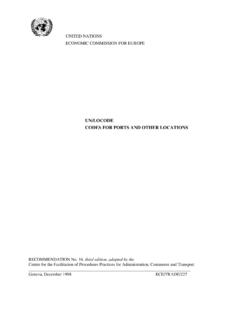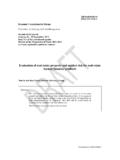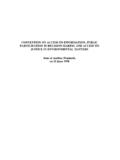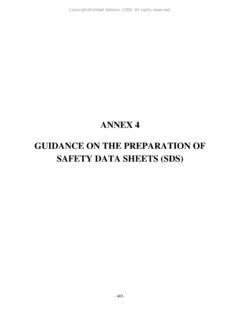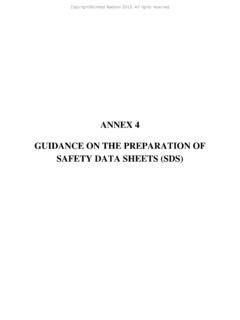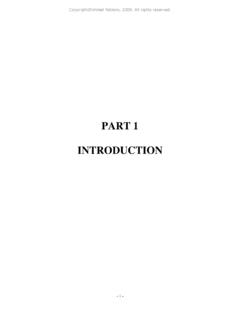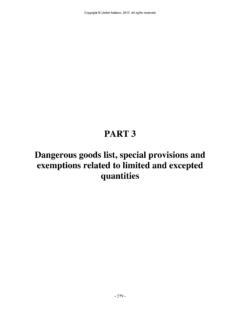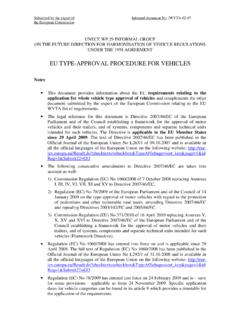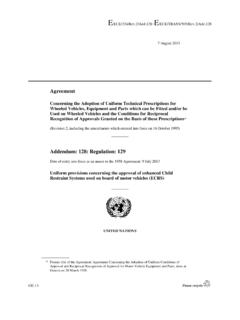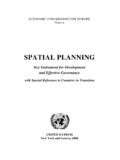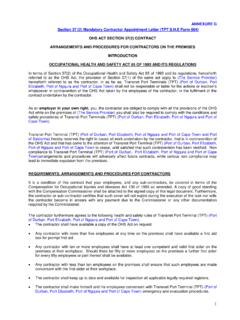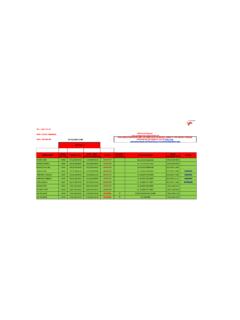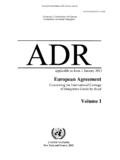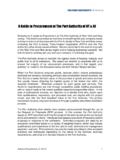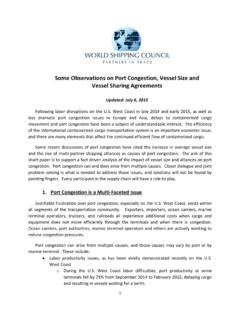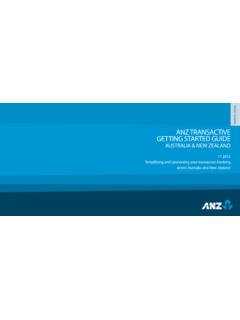Transcription of UNITED NATIONS NATIONS UNIES - UNECE Homepage
1 E/ECE/253 E/ECE/ trans /489 CONVENTION ON THE CONTRACT FOR THE INTERNATIONAL CARRIAGE OF GOODS BY ROAD (C M R) and PROTOCOL OF SIGNATURE done at Geneva on 19 May 1956 UNITED NATIONS NATIONS UNIES CONVENTION RELATIVE AU CONTRAT DE TRANSPORT INTERNATIONAL DE MARCHANDISES PAR ROUTE (C M R) et PROTOCOLE DE SIGNATURE en date, Gen ve, du 19 mai 1956 - 2 - CONVENTION ON THE CONTRACT FOR THE INTERNATIONAL CARRIAGE OF GOODS BY ROAD (CMR) Preamble THE CONTRACTING PARTIES, HAVING RECOGNIZED the desirability of standardizing the conditions governing the contract for the international carriage of goods by road, particularly with respect to the documents used for such carriage and to the carrier's liability, HAVE AGREED as follows: Chapter I SCOPE OF APPLICATION Article 1 1.
2 This Convention shall apply to every contract for the carriage of goods by road in vehicles for reward, when the place of taking over of the goods and the place designated for delivery, as specified in the contract, are situated in two different countries, of which at least one is a Contracting country, irrespective of the place of residence and the nationality of the parties. 2. For the purpose of this Convention, "vehicles" means motor vehicles, articulated vehicles, trailers and semi-trailers as defined in article 4 of the Convention on Road Traffic dated 19 September 1949. 3. This Convention shall apply also where carriage coming within its scope is carried out by States or by governmental institutions or organizations.
3 4 . This Convention shall not apply: (a) To carriage performed under the terms of any international postal convention; (b) To funeral consignments; (c) To furniture removal. 5. The Contracting Parties agree not to vary any of the provisions of this Convention by special agreements between two or more of them, except to make it inapplicable to their frontier traffic or to authorize the use in transport operations entirely confined to their territory of consignment notes representing a title to the goods. - 3 - Article 2 l. Where the vehicle containing the goods is carried over part of the journey by sea, rail, inland waterways or air, and, except where the provisions of article 14 are applicable, the goods are not unloaded from the vehicle, this Convention shall nevertheless apply to the whole of the carriage.
4 Provided that to the extent it is proved that any loss, damage or delay in delivery of the goods which occurs during the carriage by the other means of transport was not caused by act or omission of the carrier by road, but by some event which could only have occurred in the course of and by reason of the carriage by that other means of transport, the liability of the carrier by road shall be determined not by this Convention but in the manner in which the liability of the carrier by the other means of transport would have been determined if a contract for the carriage of the goods alone had been made by the sender with the carrier by the other means of transport in accordance with the conditions prescribed by law for the carriage of goods by that means of transport.
5 If, however, there are no such prescribed conditions, the liability of the carrier by road shall be determined by this Convention. 2. If the carrier by road is also himself the carrier by the other means of transport, his liability shall also be determined in accordance with the provisions of paragraph 1 of this article, but as if, in his capacities as carrier by road and carrier by the other means of transport, he were two separate persons. Chapter II PERSONS FOR WHOM THE CARRIER IS RESPONSIBLE Article 3 For the purposes of this Convention the carrier shall be responsible for the acts and omissions of his agents and servants and of any other persons of whose services he makes use for the performance of the carriage, when such agents, servants or other persons are acting within the scope of their employment, as if such acts or omissions were his own.
6 Chapter III CONCLUSION AND PERFORMANCE OF THE CONTRACT OF CARRIAGE Article 4 The contract of carriage shall be confirmed by the making out of a consignment note. The absence, irregularity or loss of the consignment note shall not affect the existence or the validity of the contract of carriage which shall remain subject to the provisions of this Convention. Article 5 1. The consignment note shall be made out in three original copies signed by the sender and by the carrier. These signatures may be printed or replaced by the stamps of the sender and the carrier if the law of the country in which the consignment note has been made out so permits. The first copy shall be handed to the sender, the second shall accompany the goods and the third shall be retained by the carrier.
7 - 4 - 2. When the goods which are to be carried have to be loaded in different vehicles, or are of different kinds or are divided into different lots, the sender or the carrier shall have the right to require a separate consignment note to be made out for each vehicle used, or for each kind or lot of goods. Article 6 1. The consignment note shall contain the following particulars: (a) The date of the consignment note and the place at which it is made out; (b) The name and address of the sender; (c) The name and address of the carrier; (d) The place and the date of taking over of the goods and the place designated for delivery; (e) The name and address of the consignee; (f) The description in common use of the nature of the goods and the method of packing, and, in the case of dangerous goods, their generally recognized description; (g) The number of packages and their special marks and numbers; (h) The gross weight of the goods or their quantity otherwise expressed.
8 (i) Charges relating to the carriage (carriage charges, supplementary charges, customs duties and other charges incurred from the making of the contract to the time of delivery); (j) The requisite instructions for Customs and other formalities; (k) A statement that the carriage is subject, notwithstanding any clause to the contrary, to the provisions of this Convention. 2. Where applicable, the consignment note shall also contain the following particulars: (a) A statement that transshipment is not allowed; (b) The charges which the sender undertakes to pay; (c) The amount of "cash on delivery" charges; (d) A declaration of the value of the goods and the amount representing special interest in delivery; (e) The sender's instructions to the carrier regarding insurance of the goods; (f) The agreed time limit within which the carriage is to be carried out; (g) A list of the documents handed to the carrier.
9 3. The parties may enter in the consignment note any other particulars which they may deem useful. - 5 - Article 7 1. The sender shall be responsible for all expenses, loss and damage sustained by the carrier by reason of the inaccuracy or inadequacy of: (a) The particulars specified in article 6, paragraph 1, (b), (d), (e), (f), (g), (h) and (j); (b) The particulars specified in article 6, paragraph 2; (c) Any other particulars or instructions given by him to enable the consignment note to be made out or for the purpose of their being entered therein. 2. If, at the request of the sender, the carrier enters in the consignment note the particulars referred to in paragraph 1 of this article, he shall be deemed, unless the contrary is proved, to have done so on behalf of the sender.
10 3. If the consignment note does not contain the statement specified in article 6, paragraph 1 (k), the carrier shall be liable for all expenses, loss and damage sustained through such omission by the person entitled to dispose of the goods. Article 8 1. On taking over the goods, the carrier shall check: (a) The accuracy of the statements in the consignment note as to the number of packages and their marks and numbers, and (b) The apparent condition of the goods and their packaging. 2. Where the carrier has no reasonable means of checking the accuracy of the statements referred to in paragraph 1 (a) of this article, he shall enter his reservations in the consignment note together with the grounds on which they are based.
